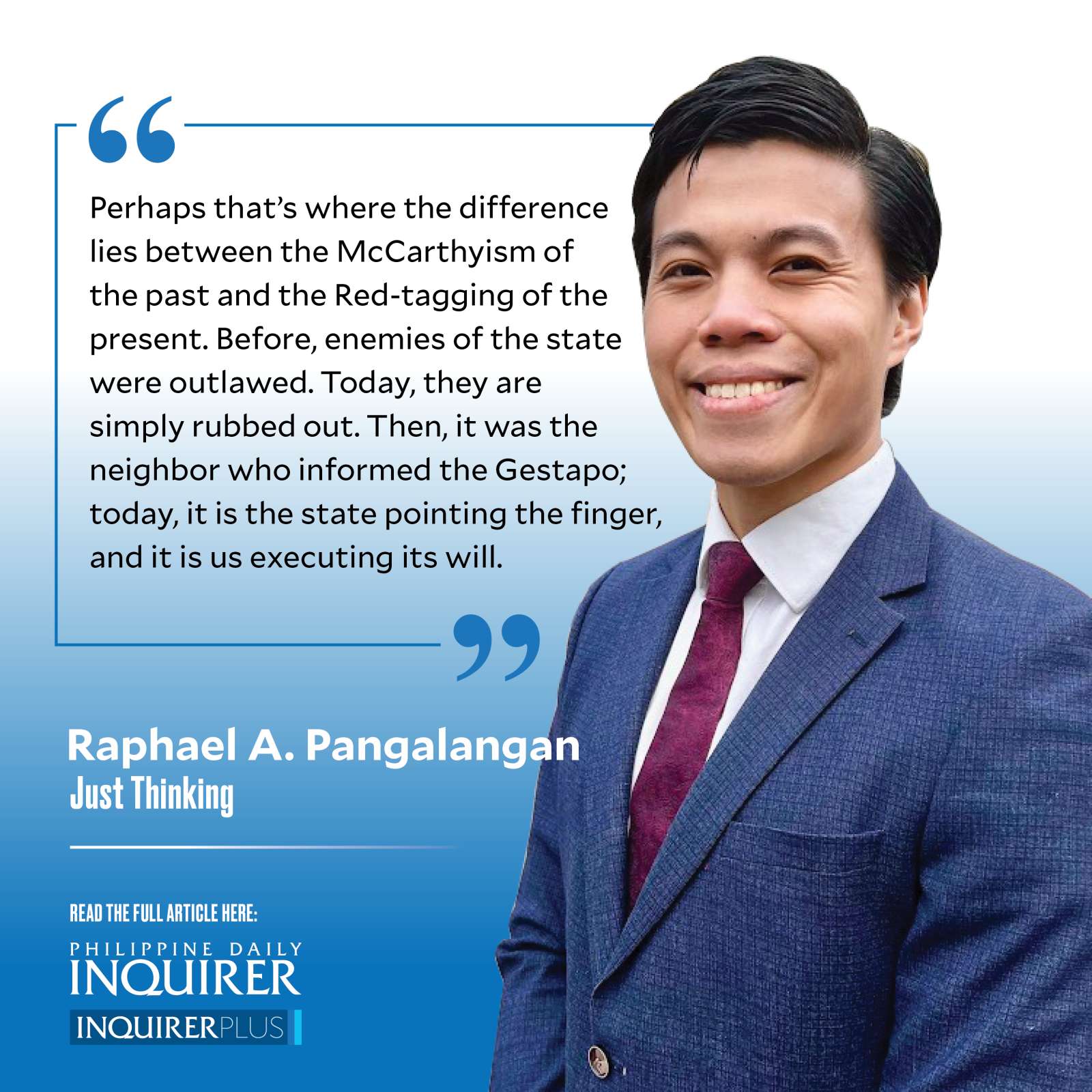Don’t call me a commie
I actually hesitated to use this term. There was a time, at the height of the McCarthyist witch hunt, to be called a commie would mean losing a job, a scholarship, a visa. Indeed, maybe little has changed. Today, when one is “Red-tagged”; harassment, disappearance, or death soon follows.
Earlier this week, Secretary of Justice Jesus Crispin Remulla shared some very interesting observations before the United Nations Human Rights Committee. He asks: “Is criticism a one-way street? If a person can dish out criticism, they should be able to take criticism[.]” This, Hon. Remulla claims, is “the essence of democracy.” Red-tagging, therefore, is but a part of it.
Hon. Remulla raises important points on the limits of expression and the exploitation of democratic space for undemocratic purposes. His views may be subclassified under two headings. One refers to Red-tagging’s alleged equalizing role. The second refers to its alleged democratizing role.
Both views are misguided.
Beginning with the first: From the lens of free speech, criticism is a one-way road. As a fellow University of the Philippines College of Law alumnus, I would have expected Hon. Remulla to know that.
Article III, Section 4 of the 1987 Constitution imposes a limitation on the state from “abridging the freedom of speech, of expression, or of the press, or the right of the people peaceably to assemble and petition the government for redress of grievances.” The limits of this provision—indeed, the invocation of any provision in the Bill of Rights, save for the right to privacy pursuant to the outlier case of Zulueta v. Court of Appeals—applies to the state alone. Political speech, such as that critical of the state, are afforded the highest level of protection. But state “speech” critical of the critics is received with suspicion.
While there is a fundamental right to freedom of expression, there is no such thing as a “sovereign right” to free speech. Other than those instances in international law when a state is treated as a subject vis-à-vis other states, rarely do we adopt the language of state “rights” at all. With the change from individual to state comes an idiomatic and doctrinal shift from “right” to “authority,” or “duty.”
Red-tagging, therefore, cannot just be explained away as the clash of differing opinions between peers, as Hon. Remulla attempts to do. The rules that apply to private individuals differ from the rules binding on state actors. Perhaps it is for this reason that both House Bill No. 9437 and Senate Bill No. 2121 of 2021—both providing for the criminalization of Red-tagging—prohibit and punish Red-tagging by state actors alone.
This may be a bitter pill to swallow, but what’s sauce for the goose is not sauce for the gander. Though it may seem unfair, it is merely the structure of constitutional order; deliberately leveling the playing field, we lone individuals share the Goliathan state.
But even if we were to leave technicality to the wayside, still, Hon. Remulla’s view simply overlooks the kinetic facet of Red-tagging. This leads to our second point: Red-tagging is not part of democracy.
What makes the practice so dangerous is not solely the expression it evokes, but the action it incites. Red-tagging, therefore, may be characterized to be more than just critique, but conduct. And as one may easily fathom, conduct—more so dangerous conduct—falls within the easy ambit of regulation.
In Hon. Remulla’s defense, in many unfortunate ways, democracy and Red-tagging have found themselves entwined throughout history. Albeit, the wrong side of it.
We need not look further than our own shores. When Republic Act No. 1700 (the Anti-Subversion Act of 1957) was enacted, President Carlos P. Garcia declared that “[w]hat the present law punishes is not dissent or heresy but subversion and conspiracy.” In reality, the RA 1700—established Committee on Anti-Filipino Activities—was used to target anyone who questioned pro-US policies. Similarly, Ferdinand Marcos Sr. issued Presidential Decree Nos. 885 and 1835, outlawing all subversive organizations “not covered by RA 1700” so as to further quell dissent.
But perhaps that’s where the difference lies between the McCarthyism of the past and the Red-tagging of the present. Before, enemies of the state were outlawed. Today, they are simply rubbed out. Then, it was the neighbor who informed the Gestapo; today, it is the state pointing the finger, and it is us executing its will.
——————
thinkjustly@gmail.com





















